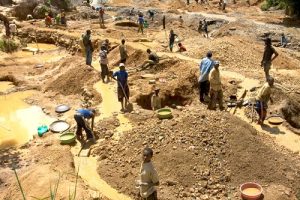BY GETACHEW MINAS
In Ethiopia, the modern mining industry is an “infant” technological business. It involves automated equipment, computer-aided design, and control systems.
It is committed to safety and environmental responsibility. If properly utilized, mining is a major source of national revenue and employment to the Ethiopian economy.
It is a source of energy such as electricity generated from mined coal. Other mineral resources also contribute to the national income of a country if they are properly explored and developed.
Mineral development involves exploration, opening and closure of mines and quarries, rehabilitation of abandoned mines, and dissemination of information on geology.
Ethiopian geologists are responsible for locating natural reserves of minerals, petroleum and other useful natural resources. They also lay out the plans for exploitation, and devise instruments for the “safe extraction” of these resources from under the earth.
While planning the extraction of minerals, the geologist also has to keep in mind the health, safety and welfare of workers. Geologists are expected to have knowledge of other disciplines including engineering, metallurgy, commerce, economics, management, legal and information technology. The field of geology promises total job satisfaction, high compensation, and a prosperous career.
The mining sector is an important source of foreign exchange for developing countries, including Ethiopia. As the sector is technology intensive it requires modern geological skills. It requires foreign direct investment (FDI) with “local” joint venture that uses relevant technologies for the productive utilization of mineral resources of a country.
Several countries that host mining projects have faced “painful” fiscal and monetary adjustments. Many of the major mining companies have seen changes in their management teams, financial structures and operational plans.
The mining sector is very sensitive to changes in minerals market prices. These prices are mainly determined by the “buyers” at the international market.
The producers and “suppliers” have little say in determining these prices. The mineral market is, therefore, dominated by the buyers to the dismay of suppliers. Another related issue is the “volatility” of such prices which makes market analysis a difficult task.
Price volatility reduces the important role of the mining industry in the global economy. The sector, as a result, requires serious attention if it is to contribute significantly to the economic performance of an increasing number of low and middle income earners.
Mineral production shifted from traditional to modern technology, exploiting large and often “remote” resources. This contributes to high cost of mineral extraction, transportation, storage, packaging and marketing.
Minerals are finite and could be depleted. Mining cannot, on its own, deliver sustainable long-term development. In Ethiopia, the exploitation of minerals, particularly gold, has been unsustainable, as new mines open in place of closed ones. Individual mining companies have been exploiting minerals, displacing traditional unproductive miners.
However, the exploitation of that resource over several decades can provide various benefits. It stimulates other productive processes that can contribute to development. These include new productive activities, higher incomes, and create demand in the non-mining sectors.
The mining sector, if properly managed, regulated and supported, can be a powerful instrument for creating employment and income for Ethiopians. It contributes to higher and more sustainable levels of development of the country.
The positive aspect of such transition is based only on rising prices of mineral outputs, driven in large part by the growth in the demand for metals in the international markets. But, the market has not been conducive for the mineral sector for decades.
As pointed out by Stevens, countries endowed with mineral resources have to pursue economic “diversification” as the objective of their policy towards the extractive sector.
Many African countries, including Ethiopia, are endowed with rich but “finite natural resources” that can be extracted, but exhausted, to promote economic development.
The discovery of natural resource reserves and their extraction does “not necessarily lead” to higher economic growth, nor does it necessarily translate into better human development outcomes.
“Weak linkages” with a country’s broader economy can lead to the creation of an “enclave economy”, disconnected from other sectors, making some macroeconomic indicators look better but without creating jobs or broad-based prosperity.
The resultant “skewed” currency and fiscal and human resource allocation along with self-enrichment of political elites may lead to what is known as the “natural resource curse.” This is exhibited by the failure of many resource-rich countries to benefit fully from their natural resource wealth.
The perverse “rent-seeking” nature of some African leaders failed to respond effectively to public “welfare needs.” Sub-Saharan Africa was forecast to have the highest growth rate in 2015 of any region other than Asia. Nonetheless, many African countries still exhibit “low” human development indices, as defined by the African Development Bank (ADB).
To protect Ethiopia from the natural resource curse, economic linkages between the extractive sector and the rest of the economy need to be strengthened. This demands “effective” management to minimize unbalanced economic development.
To benefit from “resource-led” growth policy, legislative and regulatory frameworks should be both pro-growth and pro-development. They have to be designed to mobilize and integrate human, financial and technical resources.
Ethiopia may encourage public-private collaboration to harness investments in human resources, infrastructure developments and capital investments.
A growing extractive sector enables other economic sectors to create and extend new opportunities to the service sector such as banking, hotels, and transport that further create employment for Ethiopians.
Ethiopian investors, as providers of permanent employment for citizens, need “predictability” of fiscal, regulatory and related governance frameworks.
These factors reduce uncertainty and avoid risk. Good governance, devoid of corruption, is generally regarded as a “guarantor” of investment. Investors are ready to invest their resources where peace and security is guaranteed.
The role of the government is to attract investors by guaranteeing “peaceful” environment for undertaking businesses in the mining sector. This promotes productive use of mineral and human resources of the country.
Investors are sources of revenue for the government; they create employment, earn foreign exchange and secure foreign direct investment (FDI).
If the government fails to keep its obligations in serving their interests, the investors may be forced to close down their businesses and leave the country for good. This act is very harmful for the mining sector as foreign investors are the sole sources of FDI.
African economies and that of Ethiopia are heavily dependent on FDI for generating resources for the extractive industry. This sector is a contributor to the GDP, earner of foreign exchange, and generator of government revenue. Properly managed, the mining sector has linkages with other sectors of an economy.
These linkages may result in more employment, tax revenues, foreign exchange, and transfer of technology. There was considerable optimism that African economies were changing for the better. They were no longer dependent on “raw material” exports.
Ethiopia started earning foreign exchange from export of processed raw materials and commodities. However, the fall in commodity prices illustrated that country was “vulnerable” to variations in external demand. In highly competitive environment, “governance” and policy will become increasingly important factors in the performance of the mining sector.
Just as important will be the state of regulatory and administrative processes that ensure strong and diversified growth. These factors, too, will be vital determinants for attracting investment and growth in mining projects. As the WB noted, government is the single largest “determinant” of the flow of mining investments.
The Ethiopian Herald February 28/2021





